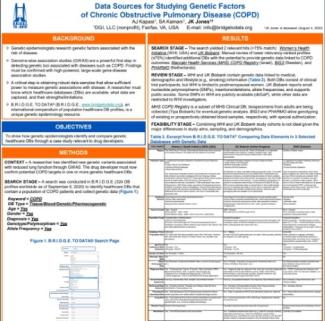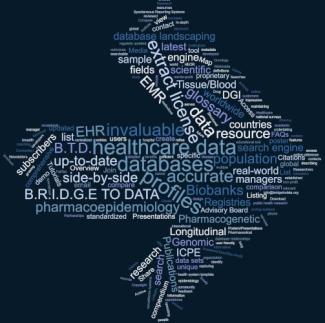We provide database landscaping services

We go beyond B.R.I.D.G.E. - Publications, web searches, our professional network, and KOLs.
Ask us for more information
Benefits
Valuable resource for research
Global
Comprehensive
Structured
Timely
Access a specialized glossary
Contact our staff
Scan recent publications & administrative contacts for each database
Archive searches & create your own database collections
Search & Compare standardized profiles side-by-side
Access most up-to-date profiles verified by database managers
Identify population healthcare databases worldwide
Key Database Features
Types of databases include:
- Longitudinal EMR and claims
- Drug or disease specific cohorts
- Registries
- National surveys
- National surveillance systems
- Spontaneous reporting systems
- Tissue/Blood
- Genomic/Pharmacogenetic
~500 standardized database profiles
135 defined data fields
Profiles from 73 countries
Regularly updated
What our customers say

The B.R.I.D.G.E. TO DATA team did an excellent job for our organization profiling over 400 real-world databases and enabled us to identify a select few that best met our research criteria. We could not have done this work as effectively and efficiently on our own without BTD; the team was experienced and professional throughout the engagement. I highly recommend them for any organization needing to identify the best database for its research project.

I highly recommend researchers in the field of pharmacoepidemiology, pharmacoeconomics, and related disciplines to use BTD to identify a suitable database which will meet the needs of their research. Also, pharmaceutical companies should look more often at the databases described by BTD if they are required to conduct PASS studies, or for those in medical affairs or clinical science who need additional information.

This "database" of databases is very useful in my day-to-day activities as it allows me to find quickly which databases will fit the best regarding the research questions I have. It is very complete and contains information on countries for which it is sometimes difficult to find information elsewhere.
What's new
In our latest newsletter we were thrilled to announce…
more »Our profile of Close Up’s Territorial Data (TD) (Market Sales Data Sub-National Level) for…
more »Close-Up: Territorial Data (TD) (Market Sales Data Sub-National Level) (Central America)…
more »We are delighted to announce the addition of The Swedish Dementia Registry (SveDem) …
more »






